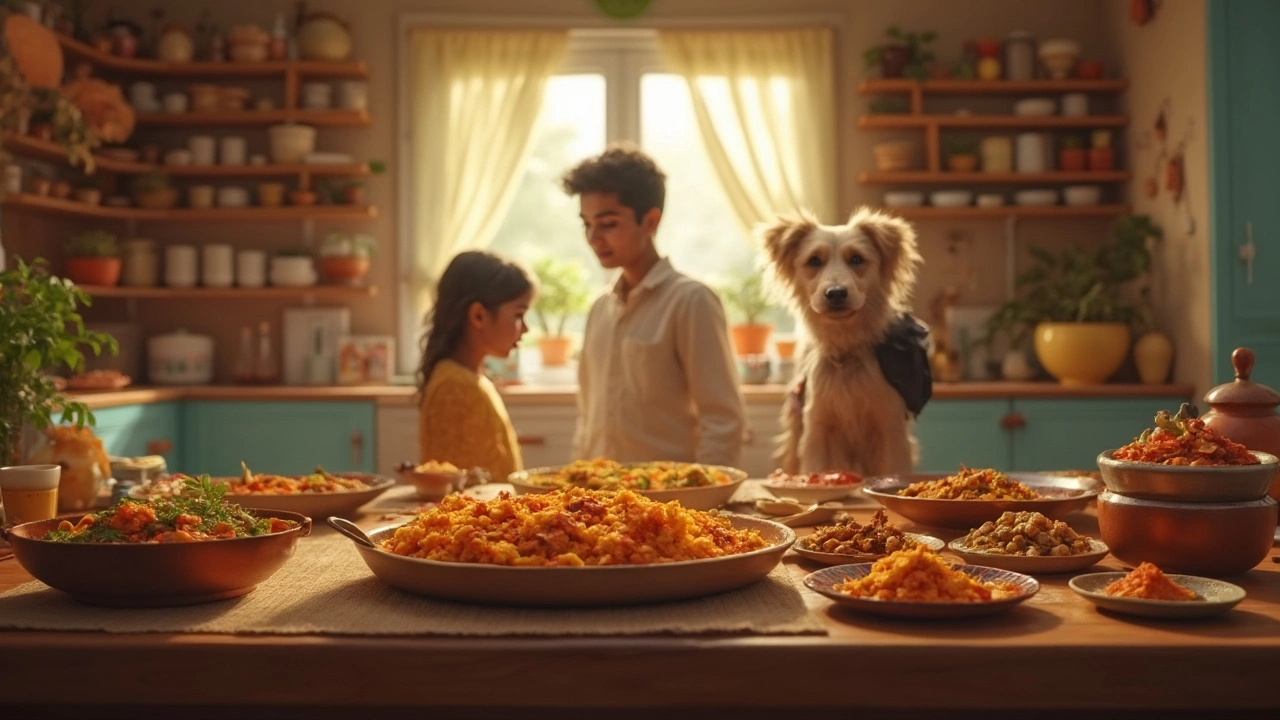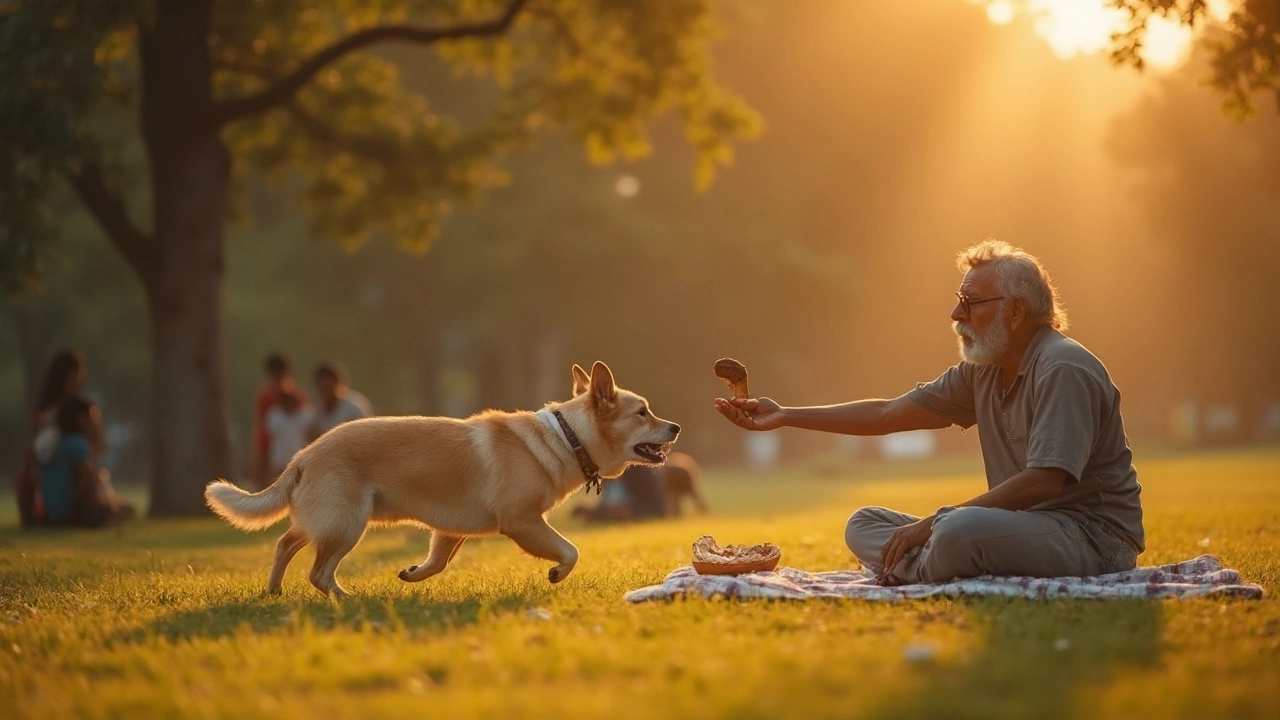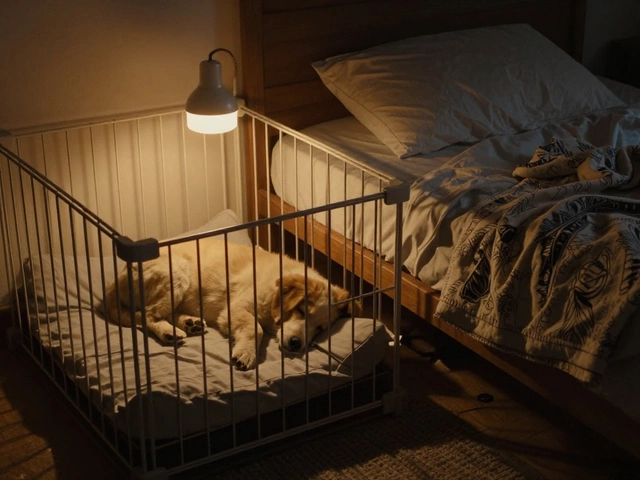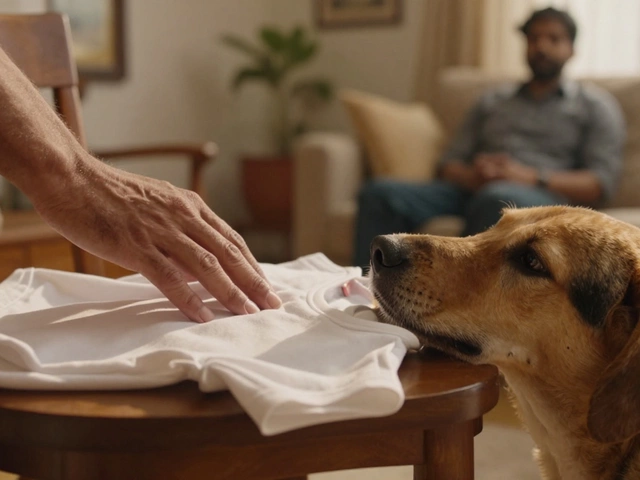
Ever thought about sharing your dinner with your dog? While it feels heartwarming, it’s super important to know if that plate of food is actually good for them. Dogs have different nutritional needs than humans, so tossing them scraps without thinking might not end well. So, can you really swap out their kibble for what’s on your plate?
Let's get this straight: not all human food is dog-friendly. Some might be a-okay, but others are a big no-no. Think about grapes and chocolate—those are on the canine blacklist! But foods like plain chicken or carrots? Those can be safe and even healthy.
If you're serious about giving your dog human food, it's crucial to learn which foods are safe, and more importantly, how to create a balanced meal. Otherwise, it's like letting a kid loose in a candy store—too much of a good thing can turn bad quickly.
Watch out for things like portion sizes, too. Dogs don't need as much food as you’d think, and giving them too many treats can lead to chubby pooch problems. Essentially, feeding dogs human food isn't just about sharing your stuff—it's about being smart and responsible.
- Understanding Canine Nutritional Needs
- Safe Human Foods for Dogs
- Foods to Avoid
- Balancing a Human Food Diet
- Potential Health Risks
- Practical Feeding Tips
Understanding Canine Nutritional Needs
Feeding your furry pal isn’t as simple as just throwing them scraps from the dinner table. Dogs have specific nutritional needs that differ quite a bit from ours. Their diet should include the right balance of proteins, fats, carbohydrates, vitamins, and minerals to make sure they’re healthy and energetic.
Proteins are a big deal. They’re crucial for dogs as they support muscle strength and repair tissues. Sources like chicken, beef, or fish are great, but make sure they’re cooked and unseasoned.
Next up, fats. These provide energy and help with things like brain development. While it's tempting to cut out fats thinking it'll help with weight, a good balance is necessary. Omega-3 and Omega-6 fatty acids from sources like fish oil can do wonders for your pup’s coat and overall health.
Carbohydrates give dogs the stamina they need for all those walks and games of chase. Whole grains like brown rice or even sweet potatoes can be good options. They should be well-cooked to make them palatable and digestible for your dog.
- Proteins: Essential for tissue repair and muscle strength. Think lean meats, cooked eggs, and unseasoned fish.
- Fats: Key for energy and brain function. Good sources are fish oil and chicken fat.
- Carbohydrates: For quick energy. Whole grains, brown rice, and sweet potatoes are excellent.
Don’t forget about vitamins and minerals. They help with everything from bone health to skin condition. While commercial dog food takes care of these, if you're feeding human food, it’s crucial to ensure your dog gets all they need. Talk to your vet about supplements if necessary.
Safe Human Foods for Dogs
Sharing a meal with your furry buddy? Not a bad idea if you know what's safe and healthy for them. Surprisingly, some human food is not only safe for dogs but also packed with nutrients they need. However, not all people foods are dog foods, so a little know-how goes a long way.
Here's a rundown of safe human foods you can confidently share:
- Carrots: Crunchy and good for your dog’s teeth, carrots are low in calories and high in fiber and vitamins.
- Chicken: Plain, cooked chicken is great for added protein in their diet. Just make sure it's boneless and skinless.
- Apples: These provide vitamins A and C, but be sure to remove the seeds and core first.
- Pumpkin: Excellent for digestion, pumpkin boasts a good mix of fiber and vitamin A.
- Peanut Butter: Dogs love it, and as long as it's free from xylitol, it's safe and full of protein and healthy fats.
- Rice: Plain, cooked rice is often recommended by vets for dogs with upset tummies.
Avoid adding any seasoning, oils, or ingredients like garlic or onions that can upset their stomach. Keeping it simple is the way to go.
If you're considering feeding these foods regularly, make sure they complement their overall dog food diet, not replace it entirely. Balanced nutrition is key. While it's great that you're keen on treating your dog, they still need the proteins, fats, and vitamins only canine diet specifically designed for them can provide.
Being aware of what your dog eats can keep them healthy and bring you peace of mind. So feel free to hand over those carrot sticks or a spoonful of pumpkin next time they give you those puppy eyes at the table!
Foods to Avoid
Okay, let's chat about what not to give your pup. Trust me, some things that seem harmless can really mess with your dog's health. It's not the end of the world if they snagged a piece of chocolate from the table, but it's definitely a habit you want to break.
Here's the basic rundown:
- Chocolate: This one gets a lot of attention, and for a good reason. Chocolate contains theobromine, which dogs can't metabolize well, leading to heart issues and even seizures.
- Grapes and Raisins: No one really knows why exactly, but these can cause kidney failure in dogs. So, safer to just skip these entirely.
- Onions and Garlic: These are toxic to dogs as they can damage red blood cells, causing anemia. Cooked or raw, keep them away from your four-legged friend.
- Avocados: Contains persin, which might upset your pooch's tummy. It's usually fine in small amounts, but best to avoid it.
- Alcohol: It sounds obvious, but it's worth mentioning. Alcohol affects dogs much more than it does humans, and even small amounts can cause big problems.
- Macadamia Nuts: Not sure why dogs react so badly, but these nuts can cause vomiting, weakness, and other not-so-fun symptoms.
Of course, these are just some of the headliners. There's more to the list, like caffeine and certain artificial sweeteners, but these are the big ones to focus on. If you want to feed your dog human food, it’s crucial to do a quick check of what’s safe and what’s not, especially if you’re trying out something new.
Quick tip: when in doubt, double-check or just hold off. Better safe than sorry! A quick online search or a call to the vet can save a lot of trouble down the line.

Balancing a Human Food Diet
Alright, so you're thinking of swapping some of Luna's meals with human food. That's cool, but it’s important to get the balance right. Dogs aren’t mini humans, and their diet needs to cover different bases. So how do you make sure they get everything they need?
First up, let's talk protein. Dogs need a fair bit of it, and it should make up a decent chunk of their diet. Lean meats like chicken and turkey can be great sources. Just remember to cook them thoroughly and skip the seasoning. Spices might jazz up your dinner, but they can mess with your pup’s stomach.
Apart from proteins, dogs need their carbs and fats too. Safe carbs include rice, oats, and pasta. They help with energy but aren't necessary at every meal. Fats, found in foods like fish and a bit of unseasoned olive oil, keep their coat shiny and skin healthy.
And don't forget the greens! Vegetables like carrots, peas, and green beans add vitamins and fiber to the mix. They help with digestion and keep things moving smoothly.
Balance is key, so here’s a rough idea of what to aim for:
- Proteins: About 40-50% of their meal should be lean meats or eggs.
- Carbs: A smaller portion, think 10-15%, as they aren’t vital at every meal.
- Fats: Around 20%, mainly from healthy sources like fish.
- Veggies: Mix in some fresh greens or cooked vegetables, about 20%.
It's essential not to just wing it. Every dog is different, and what works for your mate's Labradoodle might not work for Luna. Remember, keep an eye on how your dog reacts. More than drooling, you’re looking for good energy levels and shiny coats as signs you're on the right track.
Potential Health Risks
Feeding your dog human food sounds great and all, but it's super important to be aware of potential health risks. Some foods can lead to serious issues, and no one wants to spend a night at the vet if it can be avoided.
First off, let's dive into toxicity. Foods like chocolate, onions, garlic, grapes, and raisins are major no-goes. Even small amounts can cause anything from upset stomachs to kidney failure. So, it's crucial to keep those snack bowls out of reach!
Another thing to watch out for is obesity. If you're not careful with portions, swapping dog food for human food can quickly pile on the pounds. Obesity in dogs isn't just about looking a bit chubby; it can lead to diabetes, joint problems, and even heart disease.
Then there's the risk of nutrient imbalance. Dog kibble is specially formulated to contain everything a dog needs, but human food often lacks those essential nutrients like taurine, calcium, and certain vitamins in the right amounts. Miss those, and your dog might end up with deficiencies affecting their coat, bones, and overall health.
Let's not forget food allergies. Dogs can be allergic to some foods just like humans. If you notice itching, swelling, or weird behavior after introducing a new food, it might be time to see the vet. Keeping a note of what your pup eats can be a lifesaver in these situations.
Lastly, some foods can cause behavioral changes. Think of it like a sugar rush in kids. Too many rich or sugary foods can make your dog hyperactive or irritable. It’s always a good idea to introduce new foods slowly and see how they react.
Feeding human food requires being alert, informed, and ready to make adjustments as needed. So, while sharing with your furry friend can be wonderful, it’s about balance and being mindful of their specific canine needs to prevent any unwanted vet visits or health scares. Always consult a vet if you're considering a big dietary change!
Practical Feeding Tips
So you've decided to mix in some human meals for your pooch—great choice! But remember, it needs to be done the right way to keep your dog happy and healthy. Here’s how you can get started with some practical tips.
First things first, keeping proportions in check is key. Dogs don’t require as much food as we do, so make sure you're adjusting their serving sizes based on their size, age, and activity level. A little goes a long way!
Next up, stick to plain, cooked, and unseasoned food. While we might love all those spices and herb blends, your dog’s digestive system isn’t quite up for the challenge. Foods like a small piece of plain chicken, turkey, or some basic vegetables such as carrots and peas can be great additions.
Now, let's chat safety. Not every human food is safe for your furry friend. Keep a checklist of human foods that are safe and those to avoid. Remember, foods like onions, chocolate, and grapes are harmful to dogs.
Introducing new foods gradually is important—don’t just swap out their entire diet in one go. Begin by mixing small amounts of new foods with their regular dog food, gradually increasing over time. This allows their digestive system to adapt without any tummy troubles.
Don’t forget about hydration! If you're feeding dry human foods, ensure your pup has plenty of fresh water to wash it down. Hydration is as important as nutrition.
Lastly, consistency is king. Once you find a balance that works, stick with it to avoid confusing your dog’s diet. Regular feeding times and measured amounts help keep them at a healthy weight and in good spirits.
Done right, feeding your dog human food can be a rewarding experience. It brings variety to their meals and, most importantly, strengthens the bond between you two.


